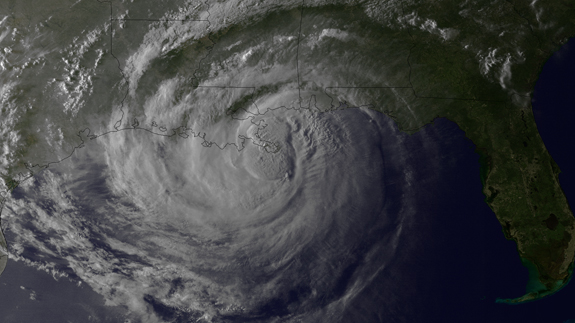
Photo by Shutterstock.
Last year, after 10 years at The New York Times, ace reporter Tom Zeller Jr. moved to Huffington Post to cover energy and environment. Part of the enticement, I assumed, was the chance to make occasional forays into commentary and analysis, the kind of stuff that’s off-limits for straight MSM reporters. Perhaps he had something to say about what he’d learned reporting.
It’s somewhat disappointing, then, to find that what Zeller has to say about climate change is this: “Global Warming Debate Needs Cooler Heads To Prevail.” The piece was posted while I was off on vacation and everyone else has forgotten about it, but it’s still bugging me. After covering today’s national politics, can this really be what Zeller has taken away, these catechisms of High-Broderism?
Like most mainstream U.S. pundits, Zeller is in the odd position of diagnosing U.S. political dysfunction without acknowledging its most salient feature: asymmetrical polarization, the fact that the right has become, in the words of respected D.C. scholars Thomas Mann and Norm Ornstein, “a resurgent outlier: ideologically extreme; contemptuous of the inherited social and economic policy regime; scornful of compromise; un-persuaded by conventional understanding of facts, evidence, and science; and dismissive of the legitimacy of its political opposition.”
The extremism of today’s right is the defining feature of the Obama era and explains much of what has happened during it, including the toxification of the global-warming debate. But Zeller doesn’t see it. Or, as a working reporter, he needs to stay on good terms with GOP sources. Or he doesn’t want to appear “partisan,” which is the kiss of death for an aspiring Very Serious Person. For whatever reason, he can’t point out the elephant in the room, so he dances gently and vaguely around it, ascribing the failure of climate action to a surfeit of stridency and a deficit of sweet reason. No specific people, views, or institutions come in for criticism, just “ideology.”
Zeller cites Dan Kahan’s work on “cultural identity” and how it shapes our perceptions of science and risk. (I’ve discussed Kahan several times — here, here, here.) He also cites the work of Yale’s Anthony Leiserowitz on global warming’s “six Americas” [PDF]. (Leiserowitz is also a frequent topic on Grist.) Zeller draws on both to argue, sensibly enough, that we need to make room for varied worldviews and priorities. There are many ways to approach climate change; we must all be cognizant of our audience.
Fine. So how could climate hawks put this into practice? “In practical terms,” Zeller writes, “that might mean not just condemning the evils of oil and gas companies, but highlighting the inevitable role of markets and technology and innovation in helping to curb planet-warming emissions.”
Huh. There’s a thought. Wait, hang on, I think I recognize “markets and technology and innovation” from somewhere … ah yes, it’s everything said about climate policy in the last 10 years, by everyone.
Really. Greens are constantly singing the praises of innovation and technology. You can’t swing a dead cat on the internet without hitting someone waxing eloquent on the power of markets to solve climate change. That’s what “green jobs” and the “new energy economy” and the “third industrial revolution” are all about. It’s what cap-and-trade was all about! Cap-and-trade was a) a compromise, meant to b) harness the power of markets and c) appeal to a wide variety of worldviews and interests. It wasn’t that long ago. Doesn’t anyone remember it?
The fact is, climate hawks, what with being burdened by an accurate understanding of climate change science, are rather desperate. They will pitch, and already have pitched, climate change any way you like it. Name your flavor! You can find dispassionate scientific takes; apocalyptic takes; accounts that emphasize markets and profit opportunities; stories that emphasize progress and innovation and economic growth; attempts to “make green macho” by emphasizing national security and NASCAR and whatever; and calls to climate concern on religious or spiritual grounds. Whatever your values, you can find a pitch geared to you.
I can’t tell you how many conferences, email threads, and discussions I’ve witnessed, agonizing over how to reach out to the skeptical or disinterested or otherwise-valued. This notion that climate hawks are insisting on a single, extreme, leftist message is just an absurd Beltway fantasy. It’s a projection by people who need greens to play that role in order to make their “two extremes and a rational middle” mode of analysis work. But the facts of the climate debate just don’t fit that analysis. The harder pundits work to cram the facts into that mode, the more absurd they end up sounding.
To wit: when Zeller finally deigns to cite an example of a “cooler head” who we might hope will prevail, it turns out to be Environmental Defense Fund President Fred Krupp, writing in the The Wall Street Journal. Now, whatever you may think of Krupp, there is absolutely nothing new in his op-ed. Nothing. That tone. Those exhortations. The bend-over-backwards both-sides-must-sacrifice schtick. It’s been said, by him and dozens of other enviros and politicians, over and over again, for years. Decades now! Zeller seems to find comfort in Krupp simply because Krupp has a kind of reasonable, reach-across-the-aisle affect that Zeller enjoys. But identifying the kind of thing you enjoy hearing is not analysis, it’s aesthetics.
Here’s what Zeller does not acknowledge: There was a fragile mainstream consensus forming around climate change in the 2000s. George W. Bush acknowledged it. John McCain campaigned on solutions to it. Then Obama was elected, the Tea Party picked off most of the remaining Republican moderates, and the right went crazy. It is now the official Republican position that abortion should be illegal with no exceptions for rape or incest, that the U.S. government should return to the gold standard, and that climate scientists are conspiring to lie to the public on behalf of the U.N., which wants to force people onto bicycles.
Nothing about the way environmentalists talk sent conservatives into these paranoid conspiracy fantasies. Support for climate solutions from Obama and Democrats was all it took.
The fever won’t break until conservatives are held responsible, by people who matter. Zeller has a perch where he is read by a great many people. He could identify those who bear the most responsibility for climate inaction and shame them. All pundits and Very Serious People could. That kind of social censure can work over time, particularly in status-conscious Washington. But it isn’t happening. Instead people with bizarre, corrupt views are hiding in plain sight and Zeller is joining in the vapid Beltway chorus: “everyone should talk nicer!”
There are plenty of “cooler heads” on climate, ready and willing to engage in productive discussion. But there is no one on the right in a position of power or influence willing to engage them. That’s the real problem.




